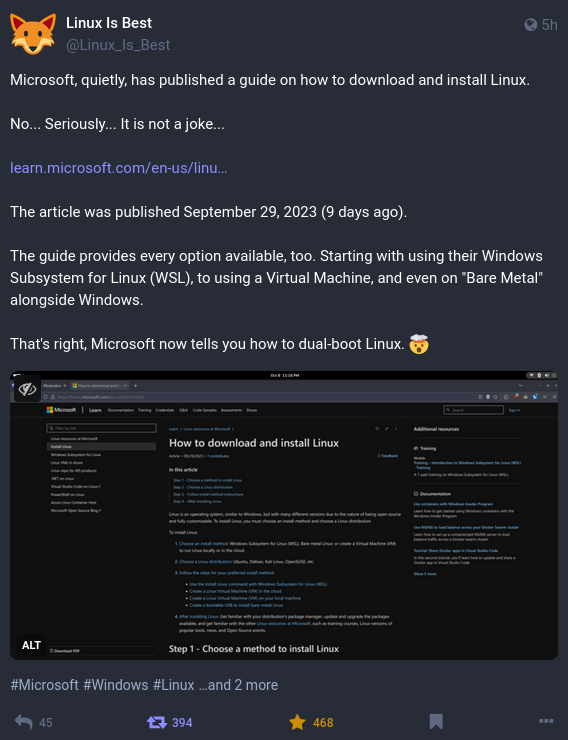this post was submitted on 09 Oct 2023
1839 points (98.3% liked)
Linux
50332 readers
1837 users here now
From Wikipedia, the free encyclopedia
Linux is a family of open source Unix-like operating systems based on the Linux kernel, an operating system kernel first released on September 17, 1991 by Linus Torvalds. Linux is typically packaged in a Linux distribution (or distro for short).
Distributions include the Linux kernel and supporting system software and libraries, many of which are provided by the GNU Project. Many Linux distributions use the word "Linux" in their name, but the Free Software Foundation uses the name GNU/Linux to emphasize the importance of GNU software, causing some controversy.
Rules
- Posts must be relevant to operating systems running the Linux kernel. GNU/Linux or otherwise.
- No misinformation
- No NSFW content
- No hate speech, bigotry, etc
Related Communities
Community icon by Alpár-Etele Méder, licensed under CC BY 3.0
founded 5 years ago
MODERATORS
you are viewing a single comment's thread
view the rest of the comments
view the rest of the comments

I, too, have had the audacity to say WSL is useful on this community and it was also met with down votes. Purists hating and gate keeping, and then they wonder why Linux isn't more popular.
WSL may be fine for a Windows user to get some access to Linux, however for me it misses the vast majority of what I value in a desktop distribution -Better Window managers. This is subjective, but with Windows you are stuck with Microsoft implementation, and if you might like a tiling window manager, or Plasma workspaces better, well you need to run something other than Windows or OSX.
-Better networking. I can do all kinds of stuff with networking. Niche relative to most folks, but the Windows networking stack is awfully inflexible and frustrating after doing a lot of complex networking tasks in Linux
-More understanding and control over the "background" pieces. With Windows doing nothing a lot is happening and it's not really clear what is happening where. With Linux, it can be daunting like Windows, but the pieces can be inspected more easily and things are more obvious.
-Easier "repair". If Windows can't fix itself, then it's really hard to recover from a lot of scenarios. Generally speaking a Linux system has to be pretty far gone
-Easier license wrangling. Am I allowed to run another copy of Windows? Can I run a VM of it or does it have to be baremetal? Is it tied to the system I bought with it preloaded, or is it bound to my microsoft account? With most Linux distributions, this is a lot easier, the answer is "sure you can run it".
-Better package management. If I use flatpak, dnf, apt, zypper, or snap, I can pretty much find any software I want to run and by virtue of installing in that way, it also gets updated. Microsoft has added winget, which is a step in the right direction, but the default 'update' flow for a lazy user still ignores all winget content, and many applications ignore all that and push their own self-updater, which is maddening.
The biggest concern, like this thread has, is that WSL sets the tone for "ok, you have enough Linux to do what you need from the comfort of the 'obviously' better Microsoft ecosystem" and causes people to not consider actually trying it for real.
well about networking: windows proxy settings just work transparently, while on linux it's just a config option that applications may or may not respect (vpn still works perfectly, but not proxy)
True, though I'm mostly invested in the kernel networking behaviors, rather than having a nicely standardized place for proxy settings so that applications have a logical place to go.
It's a fair criticism that in userspace, proxy settings have been not standardized and also TLS certificates are similarly a bit messy.
Just in case a Windows user sees this, install WingetUI and your update flow will be fixed.
Of course the problem is that wingetui isn't there by default, isn't integrated to Windows Update, no matter what, WinGetUI basically becomes yet another tray icon, alongside a half dozen other auto-updater tray icons that various vendors added since there's no integrated facility to rely upon.
So sure, it's a bandaid on winget, but it's still awkward and the ecosystem is a mess. Compared to Linux where a distribution will have, in the box, an extensible central update facility maybe serving two different types of repositories (e.g. apt and snap, or dnf and flatpak).
I'm by no means a purest but I've found WSL... More annoying than using Linux as is. Network oddities, random programs not functioning and just generally subpar as is.